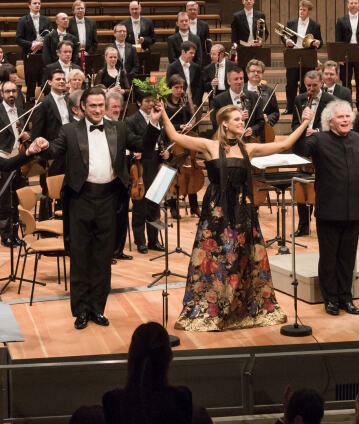Simon Rattle conducts “Tosca”

In 2017, the audience in the Philharmonie rewarded Simon Rattle’s interpretation of Puccini’s operatic thriller Tosca with standing ovations. In particular, the tonal splendour and vibrant tension of the concert performance received special praise. The Berliner Zeitung wrote: “Equally outstanding was the Latvian soprano Kristine Opolais, whose voice soars above the orchestra with fascinating lightness and at the same time gives Tosca the necessary dramatic weight.”
Floria Tosca is a highly gifted singer and a passionately loving woman, fortunate both professionally and personally. But then misfortune strikes: in order to rescue her lover, the painter Mario Cavaradossi, from the clutches of the unscrupulous chief of police Scarpia, she becomes a traitor and murderer and the victim of a fiendish intrigue. Within one day she loses everything: her love and her life. Victorien Sardou’s successful play La Tosca, which takes place in Rome at the time of the Napoleonic Wars, contains all the ingredients to spark the musical fantasies of an opera composer like Giacomo Puccini: “I see in this Tosca the opera I need, with no overblown proportions, no elaborate spectacle, nor will it call for the usual excessive amount of music,” he wrote in 1889 to the publisher Ricordi, requesting that he acquire for him the rights to set it to music. Puccini, who was intensively studying Richard Wagner’s musical language just then, was at the time still a young, unknown composer; eleven years would pass before Tosca was premiered in Rome. Together with the two previous operas, Manon Lescaut and La Bohème, and the subsequent Madama Butterfly, the work is one of the stage works that account for Puccini’s international renown as an opera composer.
What is impressive about Tosca is the dramatic concentration of the emotional events. Moments full of love and intimacy alternate in a breathtaking tempo with moments of jealousy, hate and sadistic brutality. Puccini traces this range of feelings in his psychologising, veristic musical language; at the same time, with the two famous arias of Tosca and Cavaradossi, “Vissi d’arte” and “E lucevan le stelle”, he composed two musical numbers in which interpreters can show their vocal dramatics. Kristine Opolais, giving her debut with the Berliner Philharmoniker as Tosca, is currently considered one of the most compelling Puccini singers. “He’s my favourite composer,” she admitted in an interview. “I’m a very emotional person and Puccini is such an emotional composer.” At her side is Stefano La Colla as Cavaradossi; he is one of the leading tenors of the Italian repertoire. The two have already been greatly acclaimed in the roles. The trio of protagonists is rounded out by Evgeny Nikitin, who can be experienced in the role of the villain Scarpia. The Berlin Philharmonic has enjoyed tremendous success with Puccini’s masterpiece. One need only think back to the magnificent performances under Herbert von Karajan in 1982, 1988 and 1989 in Berlin and at the Salzburg Easter Festival, as well as the legendary complete recording with Katia Ricciarelli and José Carreras.
© 2017 Berlin Phil Media GmbH
Related interviews
Category
Artists
Our recommendations
- “Tristan und Isolde” with Simon Rattle, Eva-Maria Westbroek and Stuart Skelton
- “Pelléas et Mélisande” with Simon Rattle, Christian Gerhaher and Magdalena Kožená
- Sir Simon Rattle conducts Wagner’s “Die Walküre”
- Mozart’s “Magic Flute” from Baden-Baden
- Simon Rattle conducts Wagner’s “Götterdämmerung” at the Festival d’Aix-en-Provence
- Simon Rattle conducts “Parsifal”